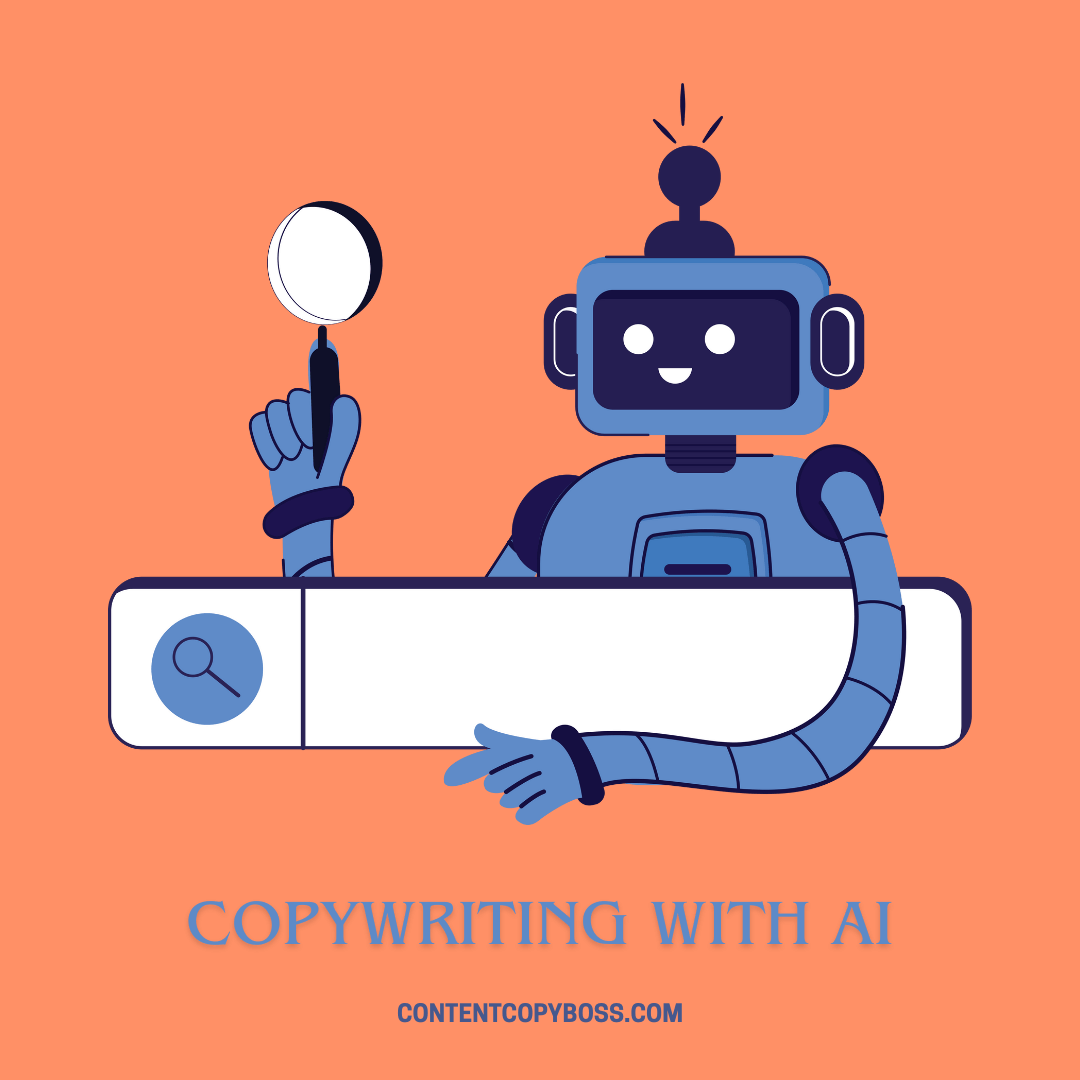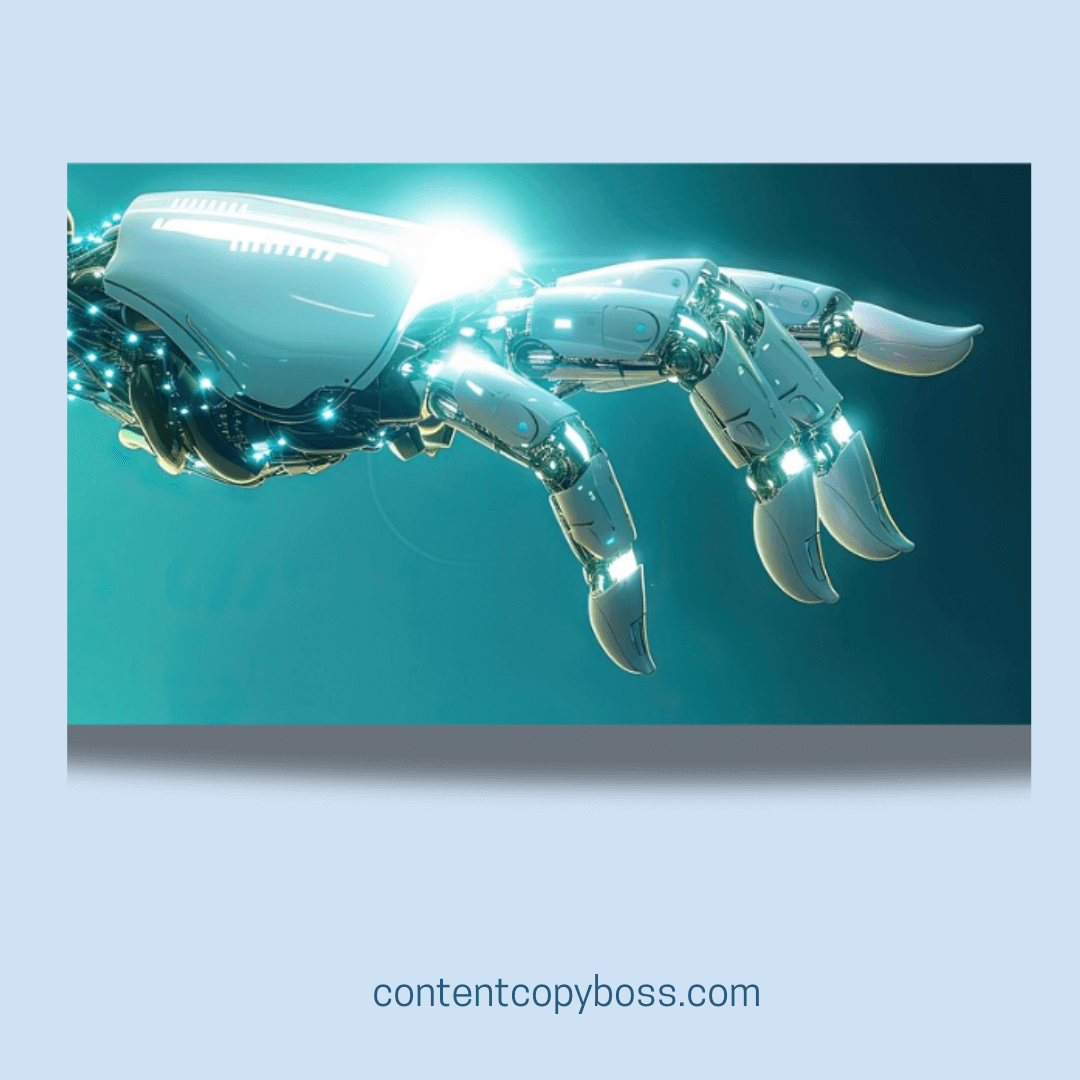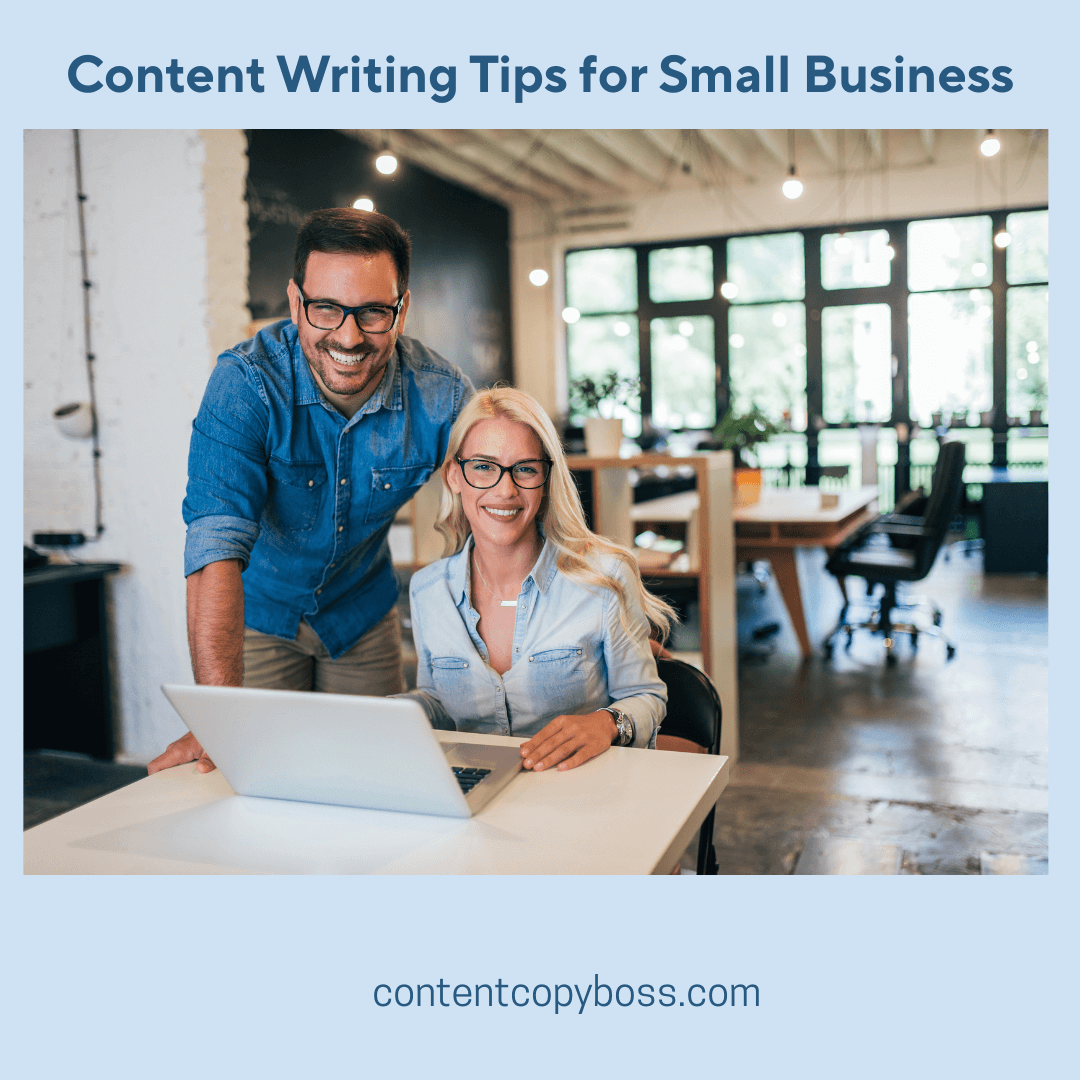
📌 TL;DR: Smart AI SEO for Small Business Growth
AI can help small businesses grow, but only when used wisely. Combine AI tools with copywriting expertise to stay visible, authentic, and safe online.
- Human oversight keeps content trustworthy
- AI multiplies, not replaces, copywriting
- Optimise content across every platform
- Follow Google’s E-E-A-T guidelines
The Buzz Around AI for SEO Content
If you run a small business, you’ve probably noticed the buzz around AI for SEO content. Everywhere you look, someone is talking about it. Some claim it’s the key to scaling content quickly and getting ahead of competitors. Others warn it could damage your rankings if it’s misused or left unchecked.
It’s no wonder small business owners feel caught in the middle. Do you use AI SEO strategies, or do you avoid them altogether? The truth is, the answer isn’t simple.
So how do you know who to trust when it comes to using AI for SEO content safely and effectively?
That’s where learning from the best in the business makes all the difference.
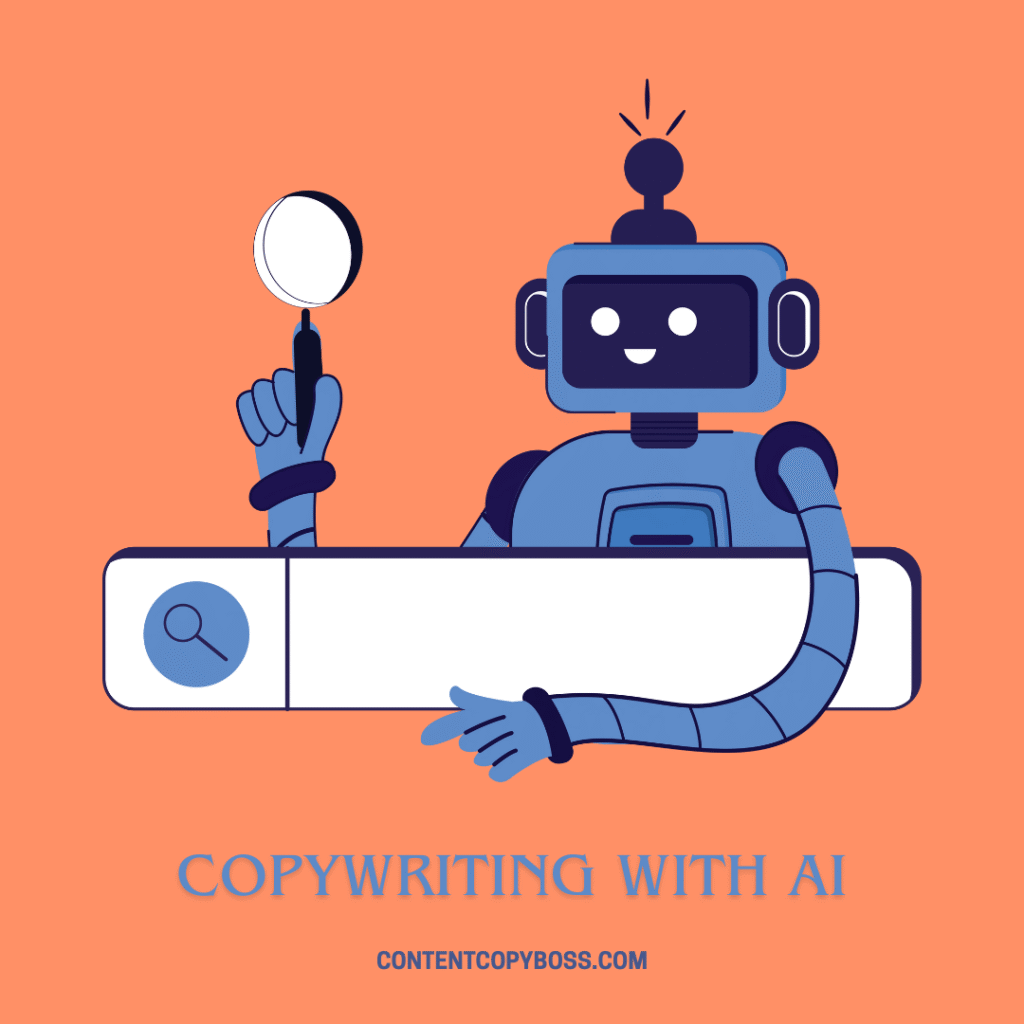
Learning AI SEO From the Best in the Business
The digital agencies leading the way in AI, SEO, and copywriting are shaping how businesses of all sizes grow online. They test new tools, refine strategies, and measure what actually works at scale.
Small business owners can learn a lot from that. By following the practices used at the top level, you gain insight into what really drives results. The good news is that you don’t need a global budget or a large marketing team to benefit.
What matters most is applying those proven principles in a way that fits your business. That means focusing on practical AI SEO strategies you can use every day. Keep it simple. Avoid the jargon and complexity that often come with big-agency methods.
When you adapt the lessons from industry leaders, you stay ahead of the curve—and make sure your content is not just current, but competitive.
AI Isn’t a Replacement—It’s a Multiplier
There’s a lot of fear that AI is coming for copywriters’ jobs. The truth is different. AI isn’t a replacement for strong writing. It’s a multiplier.
Used wisely, AI content writing for SEO can make your work faster and more consistent. It can help you research keywords, generate outlines, and even draft content that gets you started. AI tools can suggest headings, meta descriptions, and product copy. They can even help you repurpose a blog into a social post or an email.
But here’s the catch: AI alone won’t give you copy that converts. Left on its own, it risks being flat, repetitive, or even inaccurate. That’s why copywriting with AI matters. You still need a human voice to shape the story, add personality, and build trust with your audience.
When you pair AI tools with copywriting skills, you save time without losing what makes your brand unique.
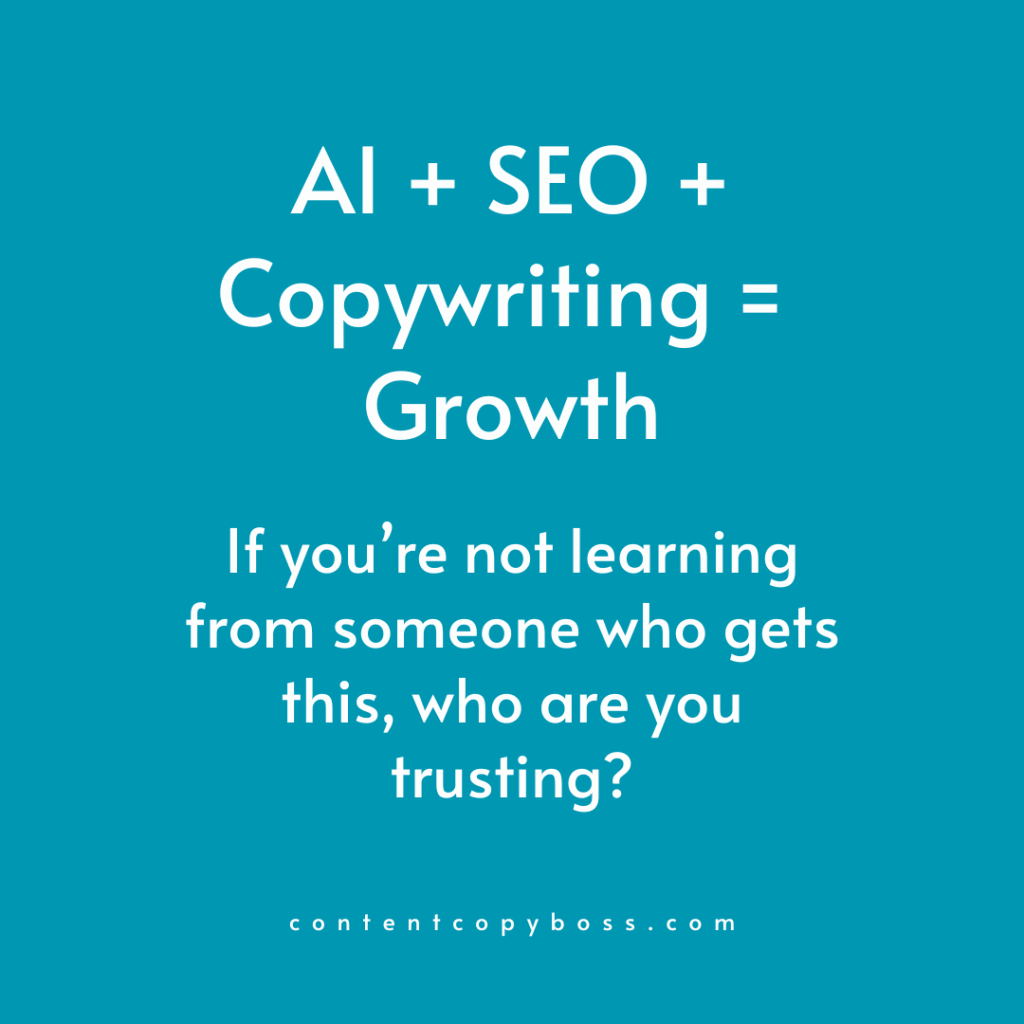
From SEO to “Search Everything Optimisation”
SEO isn’t just about ranking blogs anymore. As Neil Patel explains, it’s now about search everything optimisation.
Think about how people find you today. It could be through a YouTube video. It could be on Instagram, LinkedIn, or through a blog on your site. Every channel matters. And every piece of content should work together to make your business more visible.
That’s where AI tools for SEO content can be powerful. They help you scale across platforms without doubling your workload. A blog can become an email. An email can become a LinkedIn article. A video script can be repurposed into social captions.
The goal isn’t just to rank. It’s to show up where your audience is already searching.
Following Google’s Rules (So You Stay Safe)
Google has been clear: AI for SEO content is acceptable—but only when it’s used responsibly. Their E-E-A-T guidelines (Experience, Expertise, Authoritativeness, Trustworthiness) still apply.
That means your content must be accurate, useful, and authentic. Relying only on AI risks producing copy that’s generic or even misleading. That kind of content won’t just struggle to rank. It can also damage your reputation and weaken trust with your audience.
To stay safe, make sure you:
- Fact-check and edit every AI-assisted draft
- Add original insight, stories, or examples that only you can provide
- Write for people first, not just search engines
- Use SEO keywords naturally, without overstuffing
When you follow these steps, you get the efficiency of AI while keeping the quality and authority Google looks for.
Why You Should Be Careful Who You Trust With AI SEO Advice
There’s no shortage of people offering quick fixes for AI and SEO. Some promise overnight traffic. Others share generic prompts that don’t work in the real world. The truth is, not all advice is worth following.
For small business owners, that can be risky. Poorly written or badly optimised AI content won’t just waste your time. It can damage your reputation and even harm your search rankings. That’s why it’s important to learn from people who understand both AI tools and the fundamentals of copywriting.
Strong AI SEO strategies always come back to the same foundations:
- Clear, persuasive copy that connects with your audience
- Content written for people first, with SEO layered in naturally
- A balance of efficiency and authenticity
- Insights that go beyond prompts and focus on what actually drives results
When you follow guidance rooted in these principles, you avoid the common mistakes that hold businesses back. You also build a stronger, more sustainable online presence—one that grows with you, rather than against you.

Practical Ways Small Businesses Can Use AI for SEO Content
If you’re wondering where to start, here are three simple ways to test the waters:
- Keyword Research Support: Use AI tools to suggest related keywords, then check them with Google or tools like KeywordTool.io for volume.
- Blog Post Drafts: Let AI generate a draft, but add your voice, stories, and examples to make it unique.
- Repurposing Content: Repurpose content by turning a blog into a LinkedIn article, an Instagram caption, or an email. AI can handle the reformatting—you add the finishing touch.
By using AI for SEO content as an assistant, not a replacement, you’ll save time while building content that’s both discoverable and trustworthy.
The Difference a Little Care Makes
It’s easy to spot businesses that skip this step. Their updates and offers blur into the background. Nobody stops to read.
On the other hand, brands that take a bit more care—and teach their AI helper exactly what matters—see content that draws in real buyers. Their words build curiosity, spark interest, and turn browsers into loyal fans.
Helping Your Business Grow With AI for SEO Content
The real opportunity with AI isn’t about creating more content. It’s about creating better content—content that gets found, builds trust, and supports your goals.
For small business owners, that means using AI as a tool, not a replacement. Let it help with research, ideas, and structure. Then layer in your expertise, personality, and voice to make every piece of content truly yours.
When you combine AI tools with smart copywriting, you get content that works harder without losing its human touch. That balance means people can find you more easily. Your content feels real and true to your brand. And you can stay competitive, even as the digital world keeps shifting.
Stick with these principles and your content won’t just fill space—it will grow your business.
Frequently Asked Questions About AI for SEO Content
AI for SEO content can feel confusing, so it helps to clear up the most common questions. These quick answers will point you in the right direction.
Can small businesses really benefit from AI for SEO content?
Yes. AI can save time on research, outlines, and first drafts. The key is human input—your insights, stories, and brand voice—to keep content authentic and effective.
Will Google penalise me for using AI content?
No, not if you use it responsibly. Follow Google’s E-E-A-T guidance: fact-check, avoid duplicate or low-quality copy, and create content that’s genuinely useful for your audience.
What are the risks of using AI for SEO content?
Generic writing, inaccuracies, and keyword stuffing. These can harm rankings and trust. Always review AI drafts and add original insight.
How do I start using AI SEO strategies in my business?
Start small. Use AI to generate keyword ideas, blog outlines, or social drafts. Then refine with your expertise. Expand into repurposing content across platforms over time.
Is AI copywriting enough on its own?
No. AI is a tool, not a replacement. The best results come from combining AI efficiency with human creativity and strategy to keep content visible, authentic, and competitive.
Want to save time and get better results from AI? My AI Content Prompts will help you create blogs, posts, and emails that actually sound like your business. Fill in the form below to download your copy.
Want more practical tips to help your website stand out and grow your business?
Join my newsletter, The Copy & Clarity Edge, for quick tips, real-world examples, and easy wins, all delivered straight to your inbox. Sign up today in the form below and give your digital presence the boost it deserves.

The Power of Clear Copywriting: How Clarity Builds Confidence
📌 TL;DR: Why Clarity Is the Heart of Great Copywriting Clear copywriting helps you share complex ideas in a simple, confident way. This post breaks down the Copy & Clarity Engine and shows how it helps you write with confidence and care. Here’s what you’ll learn: Clarity connects. Confidence converts. Meet the Copy & Clarity… ContinueThe Power of Clear Copywriting: How Clarity Builds Confidence
Personal Brand Writing with AI Tools: Find Your Authentic Voice
📌 TL;DR: Using AI Tools Without Losing What Makes You, You Personal brand writing is changing fast as AI tools reshape how we create and share content. This guide shows you how to keep your voice clear, authentic, and human while still using technology to support your work. Here’s what you’ll learn: How to Keep… ContinuePersonal Brand Writing with AI Tools: Find Your Authentic Voice
AI for SEO Content: A Practical Guide for Small Business Owners
📌 TL;DR: Smart AI SEO for Small Business Growth AI can help small businesses grow, but only when used wisely. Combine AI tools with copywriting expertise to stay visible, authentic, and safe online. The Buzz Around AI for SEO Content If you run a small business, you’ve probably noticed the buzz around AI for SEO… ContinueAI for SEO Content: A Practical Guide for Small Business Owners
The Simple Way to Train ChatGPT to Write in Your Voice
📌 TL;DR: Train ChatGPT to Write in Your Voice ChatGPT can be a powerful content tool, but it won’t sound like your brand, unless you train ChatGPT to write in your voice. By teaching it your style, values, and audience, you turn bland AI text into copy that connects and sells. The secret isn’t the… ContinueThe Simple Way to Train ChatGPT to Write in Your Voice
How to Improve Blog Rankings (Even if You’re Not an SEO Pro)
📌 TL;DR: Simple Blog Tips That Boost Your Rankings Want to boost your blog rankings without getting bogged down in jargon? This guide shares five simple SEO tips tailored for women-led businesses. With relatable examples and practical steps, you’ll learn how to write posts that attract the right readers and turn your blog into a… ContinueHow to Improve Blog Rankings (Even if You’re Not an SEO Pro)
9 Common Website Mistakes (And How to Dodge Them)
📌 TL;DR: Key Website Copy Errors to Avoid for Better Results Avoiding common website mistakes can greatly improve your site’s performance. Here’s how to fix a few key issues: But these are just the basics. Fixing common issues like poor structure, unclear messaging, and mobile optimisation can transform your site and boost engagement. Want to… Continue9 Common Website Mistakes (And How to Dodge Them)
Content Writing Tips for Small Business That Connect & Convert
📌 TL;DR: Quick Takeaway for Busy Readers Struggling to write content that connects and converts? This guide shares practical tips for small business owners who want to sound real, build trust, and inspire action. Learn how to write like you talk, keep it simple, and add heart to every post. Main Points: The Power of… ContinueContent Writing Tips for Small Business That Connect & Convert
10 SEO Mistakes Small Businesses Make & How to Fix Them
📌 TL;DR Small businesses often make easy-to-fix SEO mistakes—from skipping keyword research to neglecting mobile experience. This article covers 10 common pitfalls and offers clear fixes. Plus, it explains how to build trust and authority online using Google’s E‑E‑A‑T framework. What you’ll walk away with: How to choose the right keywords (no guesswork) Why less… Continue10 SEO Mistakes Small Businesses Make & How to Fix Them
Stress-Free SEO Writing: How to Make SEO Work for You
Do you feel overwhelmed by SEO? You’re not alone. Many women-led small businesses look at SEO writing and see a tangled web of jargon, rules, and pressure. Here’s the good news: stress-free SEO writing is possible. You can make SEO work for you, even if you’re not a tech whiz or marketing pro. What Is… ContinueStress-Free SEO Writing: How to Make SEO Work for You
The Future of Hospitality: A Tech-Driven Revolution
AI and Automation: Transforming Guest Experiences In today’s fast-changing hospitality world, technology isn’t just a convenience—it’s a must. With global hotel revenue set to reach $2.1 trillion in 2024, using the latest tech is key. It helps improve guest experiences and stay competitive. AI is transforming the world of hospitality in ways that feel almost… ContinueThe Future of Hospitality: A Tech-Driven Revolution
Emotional Language in Successful Content: The Power of Words
The Power of Words in Successful Content Marketing In the current landscape of content marketing, creating a genuine connection with your audience is more crucial than ever. Emotional language is a powerful tool that can make your content stand out. By adding a human touch, small to medium-sized businesses can connect with their audience on… ContinueEmotional Language in Successful Content: The Power of Words
Write Fun Website Copy (That Sells!): Engage Your Audience
Grab Attention, Drive Conversions, Sell More Products In today’s crowded online landscape, forget forgettable website copy. Engaging content that sparks a smile or chuckle? That’s your secret weapon. A captivating website is your storefront window. Fun copywriting connects with your audience on a deeper level. It boosts engagement and, in the end, helps your bottom… ContinueWrite Fun Website Copy (That Sells!): Engage Your Audience
Case Studies: Building Brand Champions with Success Stories
How Case Studies Can Improve Your ROI Looking to boost your company’s ROI with a tool that packs a punch? Meet the case study. For small to medium-sized business marketing managers, case studies are more than just a marketing tactic. They are a powerful way to share success stories. These stories help build trust and… ContinueCase Studies: Building Brand Champions with Success Stories
Content That Converts: 5 Easy Steps to Write Magnetic Content
Content That Converts: 5 Easy Steps to Write Magnetic Copy Let’s ditch the writer’s block and create content that converts. Ignite sales with your writing. Content creation often feels like a chore because we approach it in the wrong way. Gone are the days of dry, academic writing. Today, it’s about connecting with your ideal… ContinueContent That Converts: 5 Easy Steps to Write Magnetic Content
Landing Page Copywriting: Write to Convert
9 Powerful Copywriting Tips to Skyrocket Your Landing Pages Right, let’s talk landing pages. You’ve got this fantastic new page, but no one’s signing up. Fear not, I’m here to help. Landing pages are all about that first impression, and you only get one chance. It’s like meeting your date for the first time. But… ContinueLanding Page Copywriting: Write to Convert
SEO Content Writing: Master the Art of Organic Search Results
In today’s digital age, businesses are increasingly recognizing the importance of Search Engine Optimization (SEO) to boost website visibility and attract organic traffic. To achieve top search engine rankings and attract a relevant audience, mastering SEO content writing is crucial. In this article we dive into the world of SEO content writing, exploring effective strategies… ContinueSEO Content Writing: Master the Art of Organic Search Results


